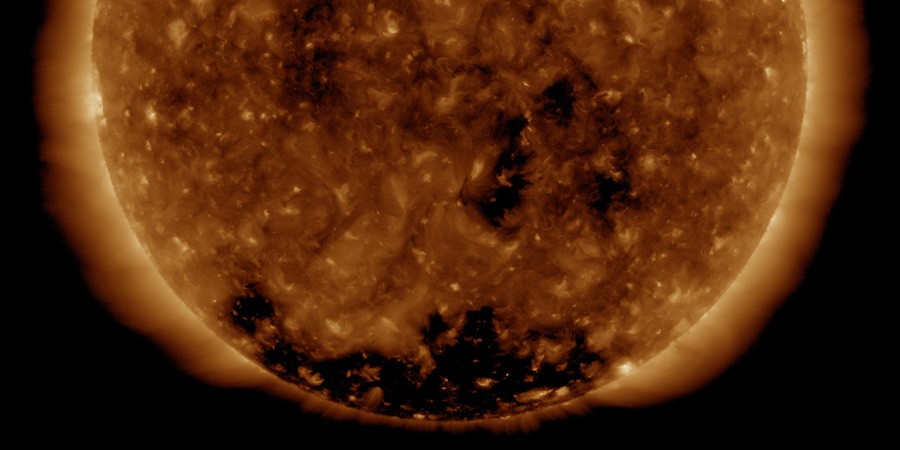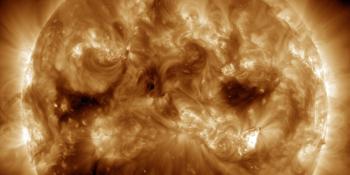Coronal hole faces Earth
Friday, 28 February 2020 19:21 UTC

Space weather has been relatively uneventful this week. Our Sun is quiet as we are close to solar minimum. No sunspot regions could be found on the earth-facing solar disk this week. We do see two small bright regions on STEREO Ahead but they look small and inactive. When it comes to auroral activity we do see a slight enhancement in the solar wind data right now but the north-south direction of the IMF (Bz) is mostly northward so enhanced auroral activity is unlikely tonight. However, if you follow us on Twitter or have the SpaceWeatherLive iOS/Android app installed you might have received an alert that we have a coronal hole facing our planet today!
Looking at the images from SDO/AIA in the 193 Ångström wavelength we see two coronal holes. First a poorly defined coronal hole on the southern hemisphere but close to the equator and of course the much larger and darker southern hemisphere polar coronal hole. It is doubtful that solar wind from the polar coronal hole could reach us but the coronal hole near the equator should send some high speed solar wind our way that might influence our planet starting this Sunday, 1 March and Monday, 2 March. Geomagnetic storming doesn't seem very likely from this coronal hole but with a bit of luck we might see a Kp of 4 which stands for active geomagnetic conditions.
A southern hemisphere coronal hole is facing Earth. Enhanced solar wind could arrive in ~3 days - Follow live on https://t.co/bsXLidnzGh pic.twitter.com/ce2f5FNJbS
— SpaceWeatherLive (@_SpaceWeather_) February 28, 2020
Thank you for reading this article! Did you have any trouble with the technical terms used in this article? Our help section is the place to be where you can find in-depth articles, a FAQ and a list with common abbreviations. Still puzzled? Just post on our forum where we will help you the best we can!
Latest news
Latest forum messages
Support SpaceWeatherLive.com!
A lot of people come to SpaceWeatherLive to follow the Sun's activity or if there is aurora to be seen, but with more traffic comes higher server costs. Consider a donation if you enjoy SpaceWeatherLive so we can keep the website online!

Space weather facts
| Last X-flare | 2025/03/28 | X1.1 |
| Last M-flare | 2025/04/01 | M2.5 |
| Last geomagnetic storm | 2025/03/27 | Kp5 (G1) |
| Spotless days | |
|---|---|
| Last spotless day | 2022/06/08 |
| Monthly mean Sunspot Number | |
|---|---|
| February 2025 | 154.6 +17.6 |
| April 2025 | 152.5 -2.1 |
| Last 30 days | 130.7 -17.9 |


